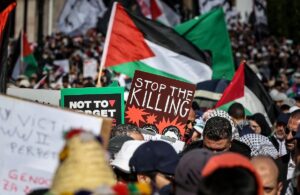Washington, DC – Hatice Cengiz, the fiancée of murdered Saudi journalist Jamal Khashoggi, appeared before a US House of Representatives panel on Thursday to share her love for her fiance and call for a US-sponsored international investigation into his killing.
But US legislators, while sympathetic to her cause, have been unable to offer concrete assurances that the United States will pursue an investigation into the grisly murder.
“All members of Congress that we have spoken with so far tell us about their regrets, but if you are asking for a clear answer, there has been no clear confirmation that there will be an investigation,” Cengiz told Al Jazeera through a translator after the hearing.
“It has been more than six months since this horrible event, but there has been no truth, justice or accountability for those responsible for this terrible incident, to this stain on human rights and press freedom,” Cengiz earlier told a House Foreign Affairs Committee subcommittee on human rights.
In passionate and heart-wrenching testimony, Cengiz described Khashoggi’s final moments after the two arrived at the Saudi Arabian consulate in Istanbul to pick up marriage papers on October 2, 2018. While Khashoggi was killed and dismembered by a Saudi assassination team inside, Cengiz waited outside for her future husband who never emerged.
“As I hoped for good news from him that our marriage papers were in order, as I eagerly awaited the happy surprise of seeing him again, no such things ever happened,” Cengiz, a Turkish national, said in written testimony.
Saudi killers
Saudi officials initially denied Khashoggi’s killing at the consulate, saying he had left the premises.
But Turkish authorities released security video showing the arrival and departure of Saudi killers dispatched from Riyadh. Turkish surveillance audio, which was shared with US officials, captured the screaming, choking moments of Khashoggi’s death.
Khashoggi and Cengiz met at a conference in May 2018 and began a relationship. Khashoggi, a journalist who wrote critically about politics in Saudi Arabia, had been banned from publishing at home. He fled to the US, was divorced from his Saudi wife as a result, but regained his journalistic voice as a columnist for the Washington Post.
“Jamal was uncomfortable with the changing political atmosphere in his country that began in 2017,” Cengiz told members of Congress. “He was disturbed by the uncontrolled exercise of power in Saudi Arabia, its violations of human rights, arbitrary arrests and detentions of scholars and writers, an unprecedented violation to people’s basic freedoms.”
| Saudi Arabia has acknowledged it was responsible for Khashoggi’s killing but has attempted to blame “rogue” security agents. The Saudi government announced legal proceedings against a number of individuals involved in the assassination, although those proceedings have not been transparent. |
The kingdom has denied any involvement of Crown Prince Mohammed bin Salman. US intelligence assessments concluded the prince ordered Khashoggi’s murder. The US Senate has passed a resolution holding him responsible.
US President Donald Trump and members of his administration have declined to assign blame to Crown Prince Mohammed and instead emphasised the importance of the US’s strategic relationship with Saudi Arabia in the Middle East.
“I simply cannot make human sense of this,” Cengiz said, speaking to legislators through a translator. “I simply cannot understand why the world has done nothing about this.
“In the early days, President Trump said that this would be solved. [House Speaker] Pelosi talked about how unacceptable this was. But so many months later, nothing has been done. That is why I am here,” she said.
“It wasn’t just Jamal that was killed it is also the values that we are talking about here: freedom, of the United States.”
The topic of the congressional hearing was the problem of rising dangers for journalists covering human rights worldwide.
More than 250 journalists were imprisoned and 54 killed in 2018, according to the Committee to Protect Journalists.


